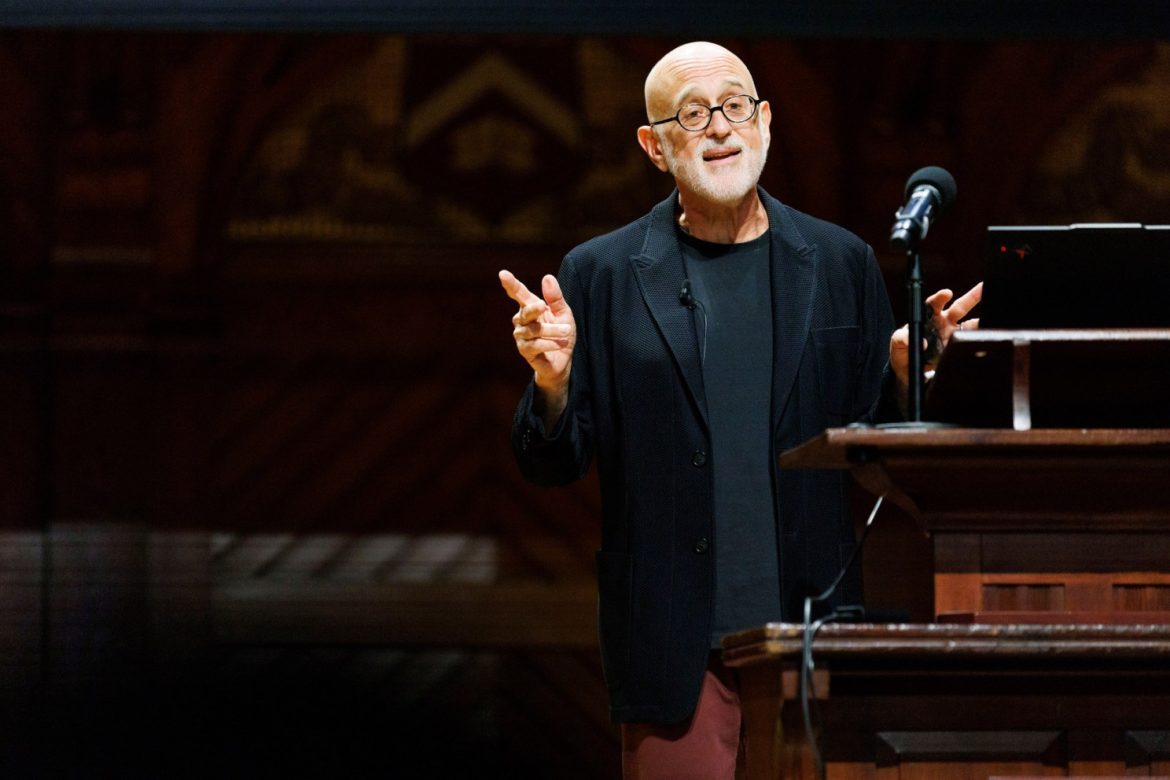Daniel Gilbert.
Veasey Conway/Harvard Staff Photographer
Health
What science says about Mom’s happiness advice
Data, wisdom meet in social psychologist’s lecture
Daniel Gilbert’s mother gave him some advice many years ago on finding happiness.
Last week the social psychologist broke down what the science says about his mother’s three-pronged formula — marriage, money, and children — during the Division of Continuing Education’s inaugural Dean’s Distinguished Lecture in Sanders Theatre.
“I thought my mom’s recipe for happiness was original,” said the Edgar Pierce Professor of Psychology, “but then I became a scientist and discovered that everybody’s mom had this recipe.”
According to Gilbert, his mother may have been partly right — at least when it comes to marriage. Studies have shown that married people are on average happier than those who are unmarried, and the effect holds across decades of data. But he added, “It isn’t marriage, per se, that makes you happy. It’s the good marriage you have. If a marriage is good enough to keep, you’ll likely get a happiness boost from keeping it. If it isn’t, you’ll likely get one from leaving.”
Turning to income, Gilbert debunked the ancient notion that money and happiness are unrelated. “When people are hungry, cold, or sick, they are not happy,” he said. “Money absolutely makes people happy — because it buys them out of almost every form of human misery.”
However, research shows that the relationship between money and happiness follows a flattening curve: People at lower levels of wealth became very happy the more money they made, but happiness tended to decrease once their finances reached a certain high point. Gilbert cited work by Nobel Prize winners Daniel Kahneman and Angus Deaton, who found that increasing social connections often outweighed massive financial gain. Their 2010 study revealed that the mood boost from spending a day with loved ones was seven times larger than the boost from quadrupling annual income.
“Trading time with people you love for money that won’t do anything for your happiness is a very bad deal,” Gilbert said.
The third ingredient in Gilbert’s mother’s “recipe” — having children — proved to be a more complex data point. While many parents describe their children as their greatest source of joy, Gilbert pointed to data showing that, on average, parents report less happiness while raising kids. The effect is particularly pronounced for young, single mothers, while older, married fathers tend to report the largest boosts.
“Children can be a great source of happiness,” Gilbert said, “but they can also be a great source of stress and hard work. Whether they increase or decrease happiness depends on how those two things balance out.”
For ages happiness was often seen as a matter of luck. Gilbert noted that because of advances in agriculture, industry, and technology, many people today live longer, healthier, and more prosperous lives than their ancestors could have imagined. “For the very first time, human happiness is not just in the hands of fate,” he said. “To a large extent, your happiness is under your control.”
Gilbert shared that he dropped out of high school at 16. He later found his way back to education through continuing studies and never imagined he would one day be on stage at Harvard. “Those opportunities allowed me to imagine a future that was very different than the one I was getting prepared for,” he told the audience.
The lecture, part of the division’s yearlong 50th anniversary celebration, is expected to be an annual signature event hosted by the division to foster community and discussion on thought-provoking topics, said DCE Dean Nancy Coleman.

